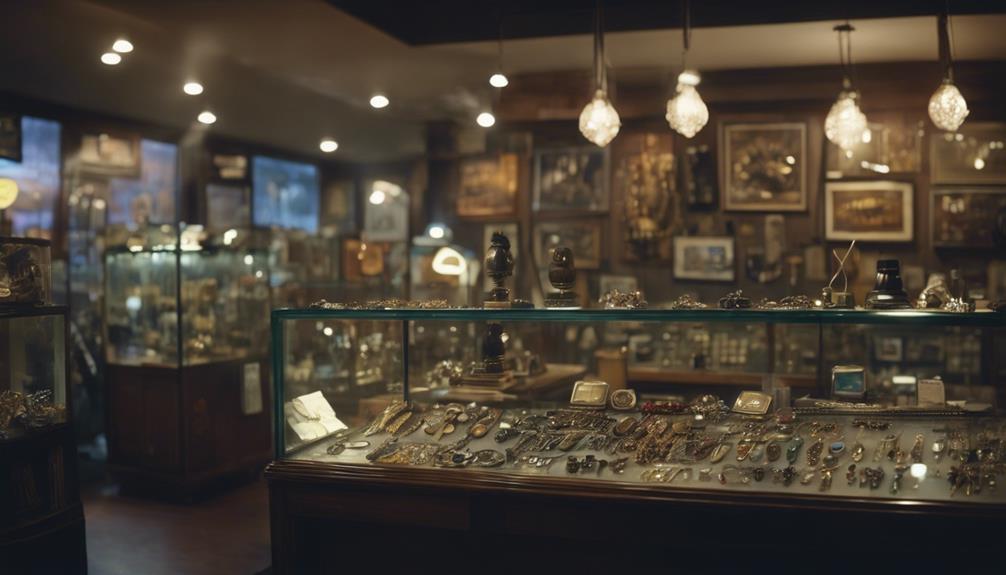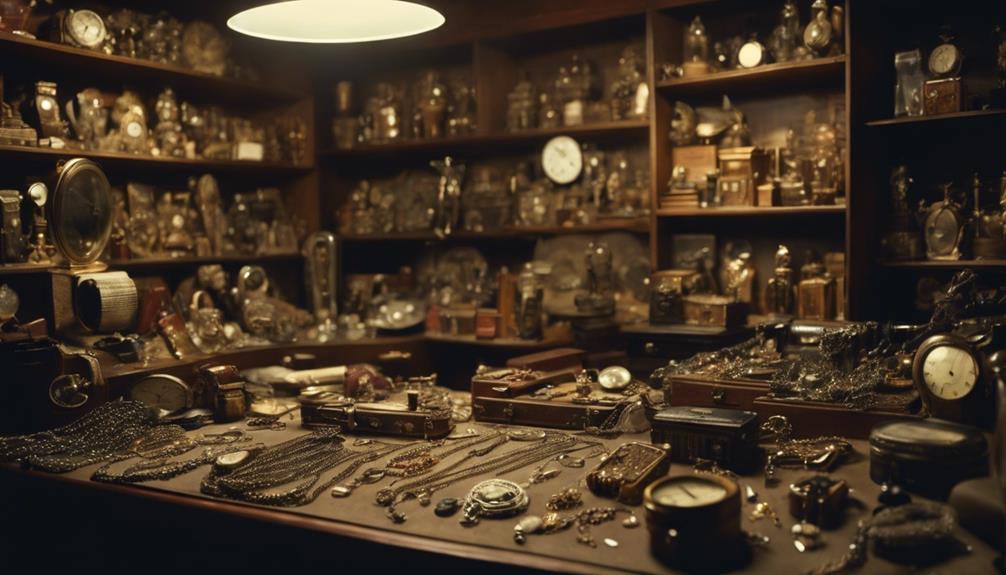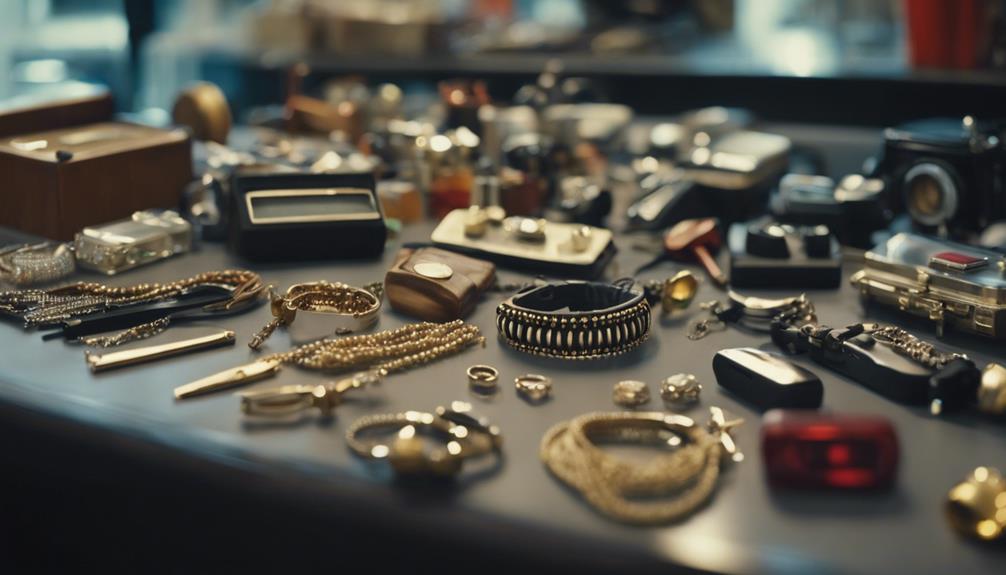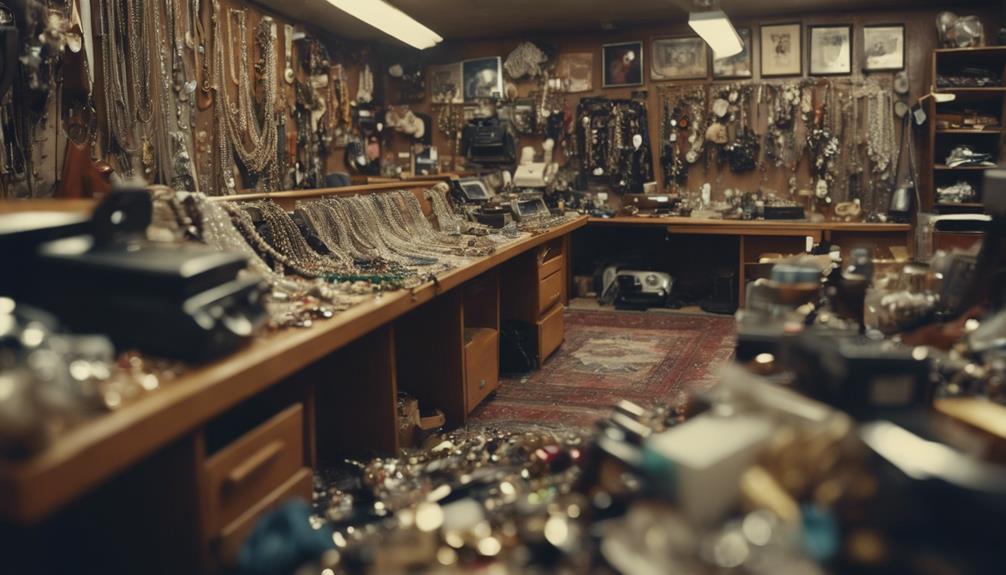What is a Pawn Shop?
What is a Pawn Shop?
What is a pawnshop?
Have you ever thought of a pawn shop as a real-life treasure hunt? Picture this: hidden gems waiting to be discovered, each with its own unique story and value.
But beyond the surface allure lies a world of intriguing transactions and historical significance. From the humble beginnings to the modern-day evolution, pawn shops have woven themselves into the fabric of society in unexpected ways.
As you navigate through the labyrinth of pawnbroking, you’ll uncover a realm where the past meets the present, offering a glimpse into a realm of possibilities you never knew existed.
How Pawn Shops Operate
Operating on a system of collateral-based lending, pawn shops provide individuals with a quick and accessible way to secure short-term loans. When you bring an item of value to a pawn shop, the pawnbroker assesses its worth and offers you a loan based on that value. This process is known as pawning. The pawn shop loan is typically a fraction of the item’s actual value, and the pawnbroker keeps the item as security until you repay the loan in full, including any interest.
Understanding how pawning works is crucial before entering into a transaction with a pawn shop. Unlike selling an item outright, pawning allows you to retain ownership of the item while using it as collateral for a loan. If you fail to repay the loan within the agreed-upon timeframe, the pawn shop gains the right to sell your item to recoup the loan amount.
Before deciding between pawning and selling, consider how much you need the item in the future. If you believe you’ll want it back, pawning might be a better option for you.




Benefits of Pawning
Consider the advantages of utilizing pawn shops for quick financial solutions. When you need cash fast, a pawnbroker can provide a convenient way to secure a loan without the need for a credit check. Wondering what you can pawn for dollars? Items like jewelry, electronics, tools, and musical instruments are commonly accepted at pawn shops. By pawning these items, you can access cash quickly and easily.
One key benefit of pawning is that it offers a discreet way to borrow money. You can obtain a loan by putting up valuable items as collateral without involving traditional banks or lenders. Additionally, pawn shops typically hold items for a set period before selling them, giving you the opportunity to repay the loan and reclaim your belongings. This flexibility can be especially helpful in times of temporary financial strain.


History of Pawn Shops
Pawn shops have a long history dating back to ancient times when people used them as a way to secure short-term loans. These establishments have always played a crucial role in providing financial assistance to individuals in need. In the past, pawn shops were known for offering pawn shop loans by accepting personal items as collateral. This practice continues today, where individuals can bring in items of value to pawn shops in exchange for a loan. The history of pawn shops is rich and diverse, with evidence of their existence found in various civilizations throughout the ages.
Throughout history, pawn shops have adapted to the changing economic landscapes, offering a valuable service to those facing financial difficulties. The concept of pawning items for quick cash has remained a constant in the evolution of pawn shops. Understanding the history of pawn shops sheds light on their significance in providing accessible financial solutions to people from all walks of life.
Items Accepted for Pawn
When considering pawning items at a pawn shop, it’s essential to know what types of goods are typically accepted for pawn transactions. Here are some common items that pawn shops always buy:
- Jewelry: Pawn shops are known for accepting various types of jewelry, including gold, silver, diamonds, and watches. These items are highly sought after by pawnbrokers due to their value and demand in the market.
- Electronics: Items like smartphones, laptops, tablets, and gaming consoles are popular choices for pawning. Pawn shops often pay competitive prices for well-maintained electronics, making them a good option if you need quick cash.
- Musical Instruments: Guitars, keyboards, amplifiers, and other musical instruments are also commonly accepted at pawn shops. The value of these items can vary based on factors like brand, condition, and demand in the local market.
Before pawning your items, it’s a good idea to research how much pawn shops pay for similar goods to ensure you’re getting a fair deal.
Pawn Shop Vs. Thrift Store
If you’re looking to explore options beyond pawning, comparing a pawn shop to a thrift store can shed light on the differences in their offerings and services.
- Inventory: Pawnshops primarily deal with items of value like jewelry, electronics, and collectibles, whereas thrift stores offer a wide range of second-hand goods, including clothing, furniture, and household items.
- Pricing: In a pawnshop, items are priced based on their value and condition, often leaving little room for negotiation. Thrift stores, on the other hand, usually have fixed prices or offer discounts based on tags or promotions.
- Buying Process: Pawnshops buy items outright or offer loans with the items as collateral. Thrift stores rely on donations or buy goods at a low price to resell, with the proceeds often going to charitable causes.
Understanding the distinctions between pawnshops and thrift stores can help you decide where to buy, sell, or donate items based on your needs and preferences.
Common Misconceptions About Pawn Shops
Misconceptions about pawn shops often stem from lack of understanding about how these establishments operate. One common misconception is that pawn shops are shady or illegal. In reality, pawn shops are legitimate businesses that operate within the boundaries of the law.
Another misconception is that pawn shops are only for desperate individuals. While some people may turn to pawn shops in times of need, others use them as a convenient way to buy and sell items.
If you’re wondering ‘what does it mean to pawn something,’ it’s essentially using your item as collateral for a loan. The pawnbroker will assess the value of your item and offer you a loan based on that value. If you’re looking for ‘pawn shops near me,’ a quick search online will help you locate the ones closest to you.
When it comes to tools, you might be asking ‘how much do pawn shops pay for tools?’ The amount they offer will depend on factors like the brand, condition, and demand for the tool. It’s always a good idea to shop around and compare offers from different pawn shops to get the best deal.
Pawn Shop Regulations and Laws in 50 States
Exploring the regulations and laws governing pawn shops across all 50 states reveals a complex and diverse landscape of legal requirements. Each state has its own set of rules to govern the operations of pawn shops, ensuring transparency and fairness in transactions.
Here are three key aspects to consider when looking at pawn shop regulations:
- Licensing Requirements: States have varying regulations regarding the licensing of pawnbrokers. Some states may require pawnbrokers to obtain a specific license to operate legally.
- Interest Rates: States also regulate the maximum interest rates that pawn shops can charge on loans. These rates can vary significantly from state to state, impacting the overall cost of borrowing from a pawn shop.
- Item Redemption Periods: Different states have specific laws governing the period during which individuals can reclaim their pawned items. Understanding these redemption periods is crucial when utilizing pawn shops for short-term loans or sales.
Navigating these regulations is essential for both pawnbrokers and customers to ensure compliance and fair dealings in the pawn industry.
Tips for Getting the Best Deal
To secure the best deal at a pawn shop, prioritize researching item values and negotiating confidently. Before heading to the shop, take some time to research the market value of the item you want to pawn or buy. Websites, online marketplaces, and price comparison tools can help you understand the fair market price. Armed with this knowledge, you’ll be better equipped to negotiate a deal that benefits both you and the pawnbroker.
When negotiating at the pawn shop, remember to be confident and assertive. Don’t be afraid to make a reasonable offer based on your research. If you’re pawning an item, highlight its best qualities to increase its value. When buying, be prepared to haggle a bit to get the price within your budget.
Additionally, consider the timing of your visit. Pawn shops may be more willing to negotiate towards the end of the month when they’re looking to meet sales quotas. By following these tips, you can enhance your chances of getting the best deal possible at a pawn shop.
Famous Items Pawned
When browsing through famous items pawned, you may be surprised by the unique and valuable pieces that have made their way into pawn shops around the world. Here are some remarkable examples that have caught the attention of many:
- Musical Instruments: Iconic guitars owned by legendary musicians like Jimi Hendrix or Elvis Presley have been pawned for various reasons, creating a buzz among music enthusiasts.
- Jewelry: From dazzling diamond necklaces worn by Hollywood stars to vintage heirlooms with intriguing histories, pawn shops have seen a wide array of exquisite jewelry pieces pass through their doors.
- Artwork: Masterpieces from renowned artists have found their way into pawn shops, showcasing a mix of beauty and financial distress. Paintings by famous artists like Picasso or Van Gogh have been pawned, creating a stir in the art world.
These items not only highlight the diverse range of valuables that can end up in pawn shops but also serve as a reminder of the unexpected treasures that can be discovered in these unique establishments.
Future of Pawn Shops
Pawn shops are poised to evolve in response to changing consumer needs and technological advancements. As more people seek convenient and fast ways to access cash or purchase items at a discount, pawn shops are adapting to meet these demands. One significant aspect of the future of pawn shops is the integration of online platforms. This shift allows customers to browse inventory, negotiate deals, and even arrange for pick-up or delivery without physically visiting a store.
Moreover, pawn shops are exploring new ways to attract customers by diversifying their offerings. Beyond traditional pawned items like jewelry and electronics, pawn shops may start accepting different types of collateral or expanding into new product categories. This evolution enables pawn shops to stay relevant in a competitive market and appeal to a broader range of clientele.
Additionally, advancements in technology are streamlining the pawn process, making transactions more efficient and transparent. With digital tools for appraisals, online payments, and inventory management, pawn shops can provide better service and enhance the overall customer experience. Embracing these changes ensures that pawn shops remain a viable option for individuals looking to buy, sell, or pawn items in the future.
Pawn shops aren’t required to conduct background checks on individuals pawning items. However, they may choose to do so at their discretion.
It’s important to remember that pawn shops operate under state and local regulations, which may vary. So, while some shops may run background checks as part of their policies, it isn’t a universal requirement across all pawn shops.
Be sure to check with your local laws and individual pawn shops for specific guidelines.
Yes, you can pawn a vehicle at a pawn shop. It’s a common practice for pawn shops to accept vehicles as collateral for a loan.
Make sure you have the necessary paperwork, such as the vehicle title and identification, when you visit the pawn shop. The value of the vehicle will determine the amount you can borrow.
Yes, pawn shops do offer layaway options for purchasing items. This means you can put down a deposit and make payments over time until the item is paid off in full. It’s a convenient way to buy something you want without having to pay the full price upfront.
Just make sure to ask about the terms and any fees associated with layaway plans before committing to one.
When determining the value of jewelry and valuable items, pawn shops often rely on expert appraisers who assess the quality, condition, and market demand for the items. These professionals carefully examine details like metal purity, gemstone authenticity, and brand reputation to provide a fair market value.
Yes, there’s a limit to the amount of money you can borrow or pawn at a pawn shop. The limit is usually based on the value of the item you’re pawning and the shop’s policies.
Shops may have a maximum loan amount they’re willing to provide to customers. It’s important to check with the pawn shop beforehand to understand their specific limits and terms for borrowing money against your items.
Conclusion
So next time you’re in a financial bind, remember that pawn shops are more than just a place to buy and sell items. They’re like a hidden treasure chest waiting to be discovered.
Just like how a diamond in the rough can be polished to reveal its true beauty, your unwanted items can be turned into cash at a pawn shop.
It’s a win-win situation for everyone involved.

